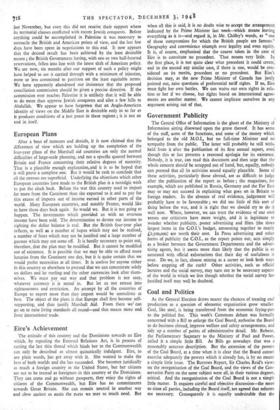Eire's Achievement
The attitude of this country and the Dominions towards an tire which, by repealing the External Relations Act, is in process of cutting the last thin thread which binds her to the Commonwealth can only be described as almost quixotically indulgent. Eire, to use plain words, has got away with it. She wanted to make the best of both worlds and she has succeeded. She becomes juridically as much a foreign country as the United States, but her citizens are not to be treated as foreigners in this country or the Dominions. They can come and go without passports, they enjoy the rights of citizens of the Commonwealth, but Eire has no commitments towards Great Britain. She can remain neutral in another war and close against us again the ports we may so much need. But
when all this is said, it is no doubt wise to accept the arrangement indicated by the Prime Minister last week—which means leaving everything as it is—and regard it, in Mr. Chifley's words, as "one of those compromises for which the British people are famous." Geography and convenience triumph over legality and even equity. It is, of course, emphasised that the course taken in the case of Eire is to constitute no precedent. That means very little. In the first place, it is not quite clear what precedent it could create; and in the second any similar case, if there is one, would be con- sidered on its merits, precedent or no precedent. But Eire's decision may, as the new Prime Minister of Canada has justly pointed out, raise questions of preferential tariff rights. If so, Eire must fight her own battles. We can waive our own rights in rela- tion to her if we choose, but rights based on international agree- ments are another matter. We cannot implicate ourselves in any argument arising out of that.


































 Previous page
Previous page